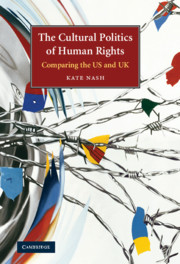Book contents
- Frontmatter
- Contents
- Preface
- List of acronyms used in the book
- Table of cases
- 1 What does it matter what human rights mean?
- 2 Analysing the intermestic human rights field
- 3 Sovereignty, pride and political life
- 4 Imagining a community without ‘enemies of all mankind’
- 5 Global solidarity: justice not charity
- 6 Conclusion
- References
- Index
4 - Imagining a community without ‘enemies of all mankind’
Published online by Cambridge University Press: 27 June 2009
- Frontmatter
- Contents
- Preface
- List of acronyms used in the book
- Table of cases
- 1 What does it matter what human rights mean?
- 2 Analysing the intermestic human rights field
- 3 Sovereignty, pride and political life
- 4 Imagining a community without ‘enemies of all mankind’
- 5 Global solidarity: justice not charity
- 6 Conclusion
- References
- Index
Summary
For cosmopolitans, we are human beings over and above anything else: nationalism is limited intellectually, morally and politically, and must be transcended, if not completely abolished. A diversity of identifications is possible for every individual – including those previously ‘captured’ by national identification, ethnicity, gender, sexuality and so on – so that a celebration of hybridity and intermingling is not only morally better than focus on national identity, it is also more satisfying and more enjoyable (see Phillips 2007: 68). In terms of claims for justice, cosmopolitanism begins from the idea that the national frame of politics is too parochial in a globalising world in which economic, social and cultural processes, and people and problems, cross territorial borders so readily (Held 1995; Beck 2006).
Cosmopolitanism is an attractive theory for our times. However, in comparison with nationalism it can convincingly be argued that it is rather elitist, an ideal for ‘frequent flyers’ who are able to transcend the social and cultural ties of locality and nation (Calhoun 2003). It is for this reason that Craig Calhoun has set out to explore the continuing importance of nationalism. In Nations Matter, Calhoun's stated aim is to escape from the opposition of nationalism and cosmopolitanism, which he sees as damaging to those gains that have been made for ordinary people in the name of the nation, but also to the cosmopolitan ideal of the equal value of all human beings (Calhoun 2007: 24–5).
- Type
- Chapter
- Information
- The Cultural Politics of Human RightsComparing the US and UK, pp. 105 - 136Publisher: Cambridge University PressPrint publication year: 2009



